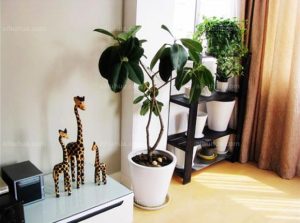
Why do houseplants cause cancer in people?
Expert: All flowers released breath, are composed of chemical molecules of chemical substances, some flowers released substances have carcinogenic effect, people can induce cancer after exposure to these substances. Now, cancer-promoting plants have been shown to cause nasopharyngeal and esophageal cancer, and people who have such plants in their homes may develop cancer by inhaling pollen and dust particles for a long time.
How long does it take to develop cancer if you grow flowers that can cause cancer?
Expert: The detailed time depends on the strength of the effect of these carcinogens and the right and wrong of the contact time, but also depends on the sensitive state of the person who contacts this substance. Not everyone will develop a tumor because of this, but people who are sensitive to this substance will have a significantly increased chance of developing a tumor.
Can all flowers be kept indoors? Is it harmful to human health?
Experts: Indoor flowers are not suitable for keeping, such as cloves, nocturnes and so on, because nocturnes at night, will stop light help, consume oxygen and exclude carbon dioxide, very bad luck for human health. If you spend too much time together, it can lead to dizziness, cough and even wheezing and insomnia, which is especially bad for people with high blood pressure and heart disease. Tuberose not only on the human central nervous system has an inhibitory effect, can make people drowsy, hypnotic effect; Can also cause human allergy cough, asthma. Orchid it sends out the aroma such as smell too long, will make people too excited and insomnia. And tulip fragrance with toxic alkali identity, in the concentration of high environment for one or two hours will be dizzy, serious can lead to poisoning, too much contact easy to make people hair loss; In addition, the house where the patient lives is not suitable for growing flowers. Pollen can cause allergic people to have allergic reactions. In severe cases, anaphylactic shock or even death may occur. Causing cancer is just one of the health risks posed by certain harmful flowers.
Which flowers are responsible for cancer?
Experts: change leaf wood, begonia, imbalsamia, tulip, five-color plum, tiger thorn, Bailiang whip, belladona flower, mountain snow, horse grass, stone diamond, hyacinth urban excretion of different levels of carcinogenic substances.
Are all people suitable for growing flowers?
Experts: For ent department, dermatology, respiratory department, obstetrics and gynecology, burn department, organ transplant patients should not give orchid, Milan, narcissus, rose, kumquat and other flowers. Allergic constitution or elderly people with weak constitution should keep some long green plants without flowers. But most flowers are non-toxic and beneficial.
Do these plants cause cancer only when they’re in an airtight environment, and do the same plants outside cause cancer?
Expert: Not usually outside. In addition, should understand some flower knowledge, do not raise harmful flowers. If you have to keep them, you have to open the Windows on time, always let in the wind, and it’s best to breed them outside, so that they stay away from people.
Information adjacency – 52 carcinogenic plants are: Shi Su, change it, thin leaves its stone mountain, wasp waist rongping, croton, comospore crotonic, croton, kirin cup, cat’s eye, spurge, euphorbia kansui, continue with the child, mountain snow, iron haitang, thousands of grass, red back, sweet osmanthus, cocktail wood more crack jatropha, coral, the linnet tallow, tallow, round leaf tallow, tung, wood tung, the ancients euphorbia stem, yuanhua, knot, wolves, poison, huang yuanhua, the elder brother of the king , soil Shen Xiang, Lilac Daphne daphne flower, Sapwood, Guangqian grass, red bud Euphorbia, pig plies, yellow edamame Fu Chai, false forsythia, Skein stem, iris, silver fern, yellow Clematis, Golden fruit olive, Mandatura, three sores, red Impatiens balsam, Reamed sheens, Acacia tree, broadleaf kiwi, Hainan Sansanu, bitter almond, achyranthes bidens.


















